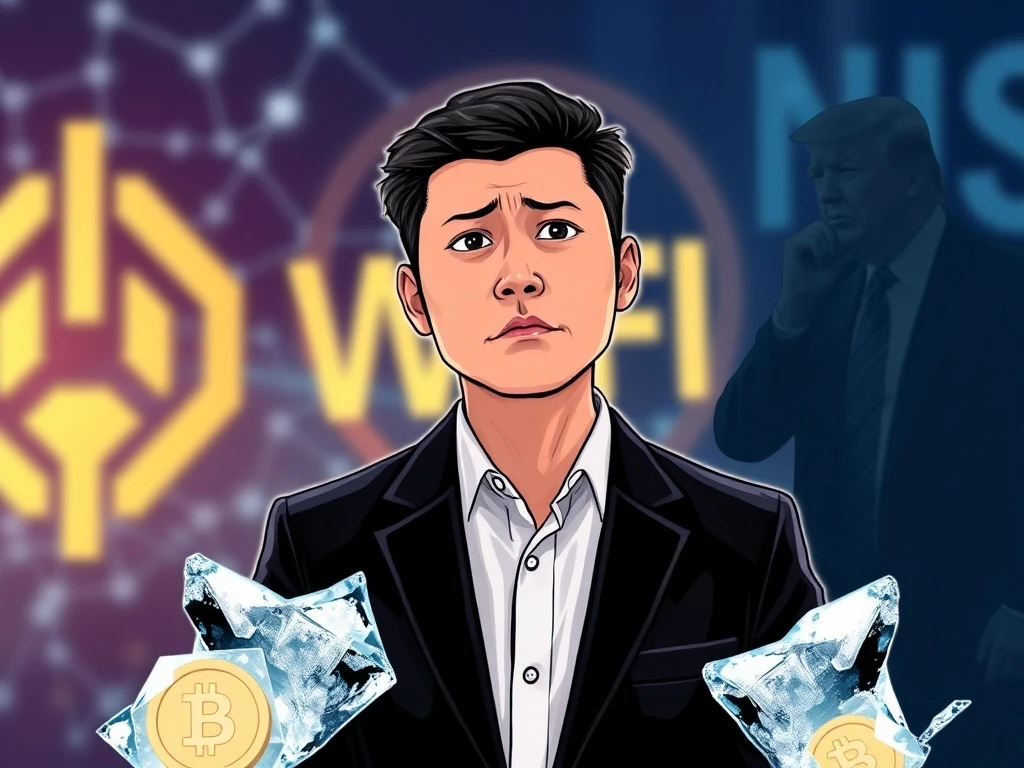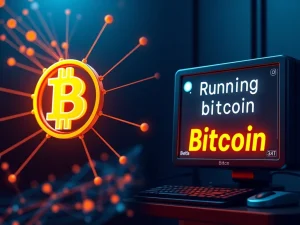Urgent Dispute: Justin Sun Demands Unfreeze of Trump-Linked WLFI Tokens

The world of decentralized finance (DeFi) often champions transparency and investor autonomy. Yet, a recent high-profile controversy involving Tron founder Justin Sun and the Trump-linked crypto project, World Liberty Financial (WLFI), challenges these very principles. Sun has publicly urged WLFI to unfreeze his WLFI tokens, which he claims were “unreasonably frozen.” This incident has ignited a debate within the crypto community. It raises questions about platform governance, investor rights, and the true meaning of decentralization.
The WLFI Controversy: Justin Sun’s Frozen Crypto Assets
Tron founder Justin Sun recently found his token allocation on World Liberty Financial (WLFI) blacklisted. This move came after blockchain trackers flagged suspicious transactions. These transactions sparked accusations of selling. Sun, however, maintains that his pre-sale allocation of WLFI tokens was “unreasonably frozen.” He argues this action could significantly damage the reputation of the Trump-family-linked decentralized finance platform.
On Thursday, WLFI blacklisted Sun’s token address. Blockchain data from Nansen and Arkham identified a $9 million transfer from his address. Crypto News Insights reported on this development. In response on Friday, Sun stated his pre-sale tokens were frozen without justification. He called on the World Liberty Financial team to unlock his investment. Sun emphasized respect for the principles of decentralized blockchain technology. He asserted that World Liberty’s decision violates investor rights. It also risks “damaging broader confidence in World Liberty Financial.”
Key points of the dispute:
- Blacklisting: WLFI blacklisted Justin Sun’s token address.
- Suspicious Transactions: Blockchain data flagged a $9 million transfer.
- Sun’s Claim: He states his tokens were “unreasonably frozen.”
- Violation of Rights: Sun believes WLFI violated investor rights.
- Reputational Risk: The incident could harm WLFI’s reputation.
Decentralized Finance Principles Under Scrutiny
Justin Sun’s appeal highlights a fundamental tension in the crypto space. He wrote in an X post, “Tokens are sacred and inviolable—this should be the most basic value of any blockchain.” He added, “It’s also what makes us stronger and more fair than traditional finance.” This statement underscores the core ethos of decentralized finance. DeFi aims to remove intermediaries and ensure immutable ownership. However, WLFI’s actions, whether justified or not, introduce a centralized control element. This control contradicts the very principles Sun champions.
Sun was an early investor in the Trump-linked crypto WLFI pre-sale. He previously indicated a long-term holding strategy for the tokens. The WLFI platform itself noted his commitment. A Tuesday X post from WLFI referenced Sun’s earlier statement. It said he “will not be selling soon (his words).” It also mentioned his plan to create yield on HTX for WLFI deposits. Furthermore, he intended to mint $200M USD1 on Tron to power the ecosystem. These prior statements contrast sharply with the recent blacklisting. They also raise questions about the communication breakdown.
A spokesperson for Justin Sun previously confirmed active communication. They told Crypto News Insights, “Justin and the WLFI team are in active communication about this matter.” Despite this, the public dispute has escalated. It suggests that underlying issues remain unresolved. The situation tests the boundaries of decentralized platforms. It also examines how they manage controversies involving prominent figures.
Allegations of Selling and Market Manipulation
The blacklisting occurred shortly after Justin Sun began moving WLFI tokens to the HTX cryptocurrency exchange. Bubblemaps, a blockchain analytics firm, reported on this activity. “Justin Sun moved $9M of his still-unlocked $WLFI to HTX,” Bubblemaps wrote in a Friday X post. They added, “In total, he sent $10M to CEXs over the past 3 days.” This movement fueled speculation among other crypto analysts. Many suggested Sun was selling his allocation, despite earlier promises.
Quinten François, a cryptocurrency analyst, expressed strong opinions. He is also the co-founder of social decentralized application weRate. François wrote in a Friday X post, “If Justin Sun really lured in WLFI tokens from HTX users with a 20% APY to lock them, and then sell them to get out of ‘his’ own position while they’re still unvested, then he deserves to get his account frozen.” This sentiment reflects a significant concern within the community. It points to potential market manipulation. Such actions, if proven, could severely damage trust in the individual and the project.
However, not all analysts agree with the selling allegations. Alex Svanevik, founder of Nansen crypto intelligence platform, offered a different perspective. He contended that Sun had not been selling his allocation. Svanevik wrote in a Friday X post, “At first, it (an AI agent) thought @justinsuntron caused the dump. Then I asked it to scrutinize the timestamps. Conclusion seems to be: he did not.” This divergence in expert opinion further complicates the narrative. It underscores the challenges of interpreting complex blockchain data. The debate over frozen crypto assets continues to evolve.
Implications for Investor Confidence and the Trump-Linked Crypto Ecosystem
The ongoing dispute involving Justin Sun and WLFI carries significant implications. It impacts not only the involved parties but also the broader crypto ecosystem. When a prominent investor’s assets are frozen, it sends a chilling message. This message particularly affects investor confidence. It questions the security and reliability of platforms. Furthermore, the association with a high-profile political family, like the Trumps, adds another layer of scrutiny. The term Trump-linked crypto itself draws considerable attention. It brings both support and skepticism.
The incident highlights a critical vulnerability in even ostensibly decentralized systems. While WLFI is a DeFi platform, its ability to blacklist an address suggests a degree of centralized control. This control is often seen as a departure from core DeFi principles. It can deter investors who prioritize censorship resistance. The controversy therefore serves as a case study. It examines the practical challenges of implementing truly decentralized governance.
Ultimately, the resolution of this dispute will be closely watched. It could set a precedent for how similar issues are handled in the future. Will WLFI unlock the frozen crypto assets, upholding the principles of investor autonomy? Or will the platform maintain its decision, citing security or anti-manipulation concerns? The outcome will undoubtedly influence perceptions of WLFI. It will also shape broader trust in the intersection of politics, finance, and blockchain technology. The integrity of decentralized finance relies on fair and transparent resolutions.










